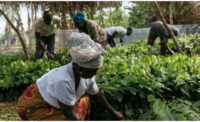Alongside releasing its 2017 corporate social responsibility report, The Hershey Co. has unveiled a new strategy — the Shared Goodness Promise — designed to make a positive difference through investments, collaborative programs and sustainable business practices.
Inspired by Hershey founder, Milton Hershey, the new strategy provides a framework for efforts in four areas: Shared Futures, Shared Communities, Shared Business and Shared Planet.
The Shared Goodness Promise, which is aligned with the United Nations Sustainable Development Goals, addresses challenges facing communities around the world. It aims to nourish children and help them succeed in school; invest in purpose-driven initiatives and business models; safeguard the environment; help Hershey communities thrive; and engage Hershey’s employees in the efforts. Earlier this year, Hershey launched the Cocoa for Good strategy, a key component of the Shared Business pillar.
“Hershey is a company that has married being purpose-driven with offering meaningful, impactful day-to-day work,” said Hershey CEO Michele Buck. “The reason is simple: We believe – and prove – that you can be a fierce competitor in the market while operating in a compassionate way with teams of people who are about each other and their communities. The Shared Goodness Promise is to see every day as a chance to be successful in a way that makes a positive difference.”
The Shared Goodness Promise includes several benchmarks:
- Nourish one million minds by 2020. For more than 100 years, since the founding of the Milton Hershey School, Hershey has been giving children the chance at a better future. Shared Futures continues that work with nutrition programs that help children around the world learn and succeed in school. In 2017, the company nourished 208,072 children, which included producing and providing the vitamin-fortified snack ViVi to 52,913 schoolchildren in Cote d’Ivoire and Ghana.
- Invest in brands and business models that make a difference in the world. As Hershey focuses on becoming an innovative snacking powerhouse, it has invested in becoming an increasingly socially responsible organization. As part of Shared Business, the company’s goal is to ensure that the ingredients that go into its products are responsibly sourced and it has already made strides: 75 percent of the cocoa and 50 percent of the coconut it sources is certified as sustainable, and 55,000 farmers in West Africa are enrolled in Hershey’s Learn to Grow sustainable agriculture programs.
- Protect biodiversity and safeguard natural environments. As part of the Shared Planet pillar, Hershey is working toward evidence-based targets to reduce its overall impact on the environment while encouraging its suppliers to adopt sustainable growing techniques. In 2017, the company began focusing on reforestation, including a partnership with the Arbor Day Foundation to plant more than 133,000 trees in the U.S.
- Enhance the lives of 10 million people. Building on its experience supporting communities where Hershey employees live and work, Hershey’s new Shared Communities pillar will invest in communities by supporting basic needs to care for vulnerable community members; advancing education and training opportunities to support the workforce of tomorrow; and promoting inclusive civic, cultural and economic development initiatives that bring community members together. In 2017, Hershey donated $11.9 million in cash and $8.6 million in products, while its employees volunteered 130,737 hours in their communities.
- Continue making Hershey a great place to work. Hershey has always looked to attract and retain employees with an engaging, innovative and diverse workplace. In 2017, the company had 50 percent female representation on its executive committee and 77 percent of its workforce reported being engaged at work.
“The Shared Goodness Promise aims to make a difference in the lives of thousands of people around the world, from the West African farmers growing the cocoa used in our products to the employees in our facilities in the United States,” said Jeff King, senior director of sustainability, corporate social responsibility, and social innovation at Hershey. “It helps us to focus our resources and the talents of our people – whether they’re nutrition, manufacturing or finance experts – in ways that are a making a powerful difference in the lives of individuals and entire communities.”





